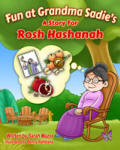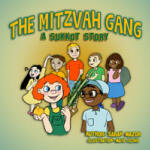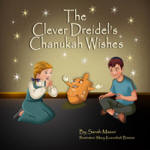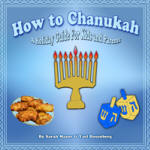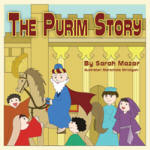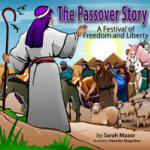
|
| • Holiday Gifts |
| Holiday Central > Rosh Hashanah > Symbolic Foods |
Rosh Hashanah Symbolic Foods
By: Rivka C. Berman, Contributor
Click Here for More Holiday Articles
CHILDREN'S BOOK for AGES 5-11
Rosh Hashanah Symbolic Foods
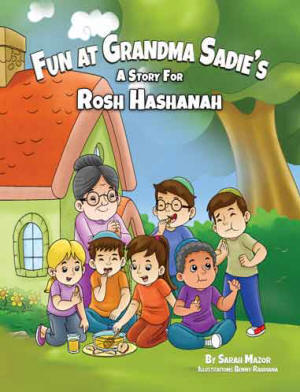
Fun at Grandma Sadie's
A Story for Rosh Hashanah
Ransack the pantry, search out the grocery stores, there is a wondrously long
and diverse list of foods to eat as omens for a good year. The notion that
eating certain foods on Rosh Hashanah was a useful thing to do was mentioned by
a Talmudic sage: “Abaye said, ‘Now that you have said an omen is significant, at
the beginning of the year each person should accustom himself to eat gourds,
fenugreek, leeks and dates.” (Keritut 6a).
The foods themselves are not magic vitamins for a good year. Eating them is a
reminder that doing superficial acts, like gulping down food and resolutions,
are not enough to secure a favorable judgment. True change is the only way.
Rosh Hashanah is not a time that we spell out a wish list to God. Most of the
liturgy is consumed with God’s coronation. Eating the good-omen foods is just a
little reminder hinting God of our desire and hopes for a happy and blessed new
year.
- Round Challah Loaves
- Apple Dipped in Honey
- Say Nuts to Nuts
- Black-Eyed Peas
- Couscous with Seven Vegetables
- Honey, Sugar or Salt on the Challah
- To Fish or not to Fish
- Head of Animal
- Gourds
- Fenugreek
- Leeks or Cabbage
- Beets
- Dates
Round
Challah Loaves
Circular challahs represent unending cycle of life and the prayer
that another year round will be granted. From another view the round
breads look like a royal crown, a reminder of the coronation of God as
Ruler on Rosh Hashanah.
There’s a tradition that back in the days
before the Exodus, the Egyptian taskmasters ate multi-cornered bread
evincing their belief in many gods. Jews formed round breads to display
their defiant belief in one indivisible God. (Project Genesis)
Apples
Dipped in Honey
Why have apples become the Rosh Hashanah symbol?
There’s a pragmatic reason. Even in the frigid Eastern European
countries, where Ashkenazic traditions formed, apples are ripe for the
picking around this time of year.
Then there are reasons that can enrich the eating experience. According
to Rabbi Shimon Apisdorf, author of Rosh Hashanah and Yom Kippur
Survival Kit (Levitathan Press, 1992), an apple tree grows differently
than other fruit trees which sprout leaves to shade their new fruits.
Apples make their way into the world without leafy protection, just like
Jews who practice their beliefs even though being different leaves Jews
vulnerable to prejudice.
Take a look in Genesis 27. It is there that Jacob claims the prized
firstborn blessing that his father Isaac had intended for Esau. Jacob
managed to do this by disguising himself as Esau and his ruse was helped
along by Isaac’s poor eyesight.
But Isaac suspected that something wasn’t right. His first words to
Jacob are “Who are you, my son?” What gave Jacob away? His voice and his
smell, says the Midrash, writings on the underlying meaning of the Torah
narrative. Esau smelled of blood of the hunt. Jacob exuded the scent of
a field, an apple field according to some commentators. In the end,
Jacob got the blessings of wealth and power he set out to get. Rabbi
Eliyahu of Vilna, the Vilna Gaon (genius), (1720-1797), wrote that we
eat apples to express our hope that we too will receive these blessings
in the year to come.
What to do
After the challah has been dipped in honey, take an apple in hand. Say
the blessing over the apple:
Barukh Atah Adonai Eloheinu Melekh HaOlam boray peh-ree hah-aytz.
We bless you Eternal God Sovereign of the
World who created the fruit of the tree.
Then say the short prayer that ties the honey-dipped apple to the wish
for a sweet new year.
short prayer that ties the honey-dipped apple to the wish for a sweet
new year
Yehi ratzon Adonai Eloheinu sheh-tee-cha-daysh ah-lay-nu shana tovah u’meh-tu-kah.
May it be your will Eternal God that we are renewed for a year that is good and sweet.
Say Nuts to
Nuts
Some Jews avoid eating nuts on Rosh Hashanah because the Hebrew word for
nut is “eh-goze” which has the same numerical values as “chet,” meaning
sin. On the Day of Judgment, the thinking goes, its worthwhile to avoid
all shades of sin even numerical ones.
Black-Eyed Peas
Egyptian Jews and others eat black-eyed peas because they are called
Rubya, related to the Hebrew word rov meaning a lot, many. Black-eyed
pea dishes, such as Hoppin’ Jack, are traditional New Year’s eats in the
American Southeast. One wonders if the slave trade had something to do
the migration this dish.
Couscous with Seven
Vegetables
The many tiny couscous grains represent a wish for a year with
blessings aplenty. Tossing seven different vegetables plays on the
number seven, which represents goodness in the natural order. Seven
earns this distinction because God created the world in seven days.
Honey, Sugar or Salt on
the Challah
Challah dipped in honey is one of the joys of an Ashkenazic Rosh
Hashanah feast. Sticky sweet honey represents the wish for a sweet new
year. The bees who made the honey impart another lesson. Bees are bring
the sweetness of honey, the bounty of pollination, and the pain of a
sting. We, too, can bring about joy, productivity or pain. It’s our
choice.
Some Sephardic Jews deliberately avoid honey because it was a fouling
agent if added to the Temple incense. Challah is dipped into sugar
instead. Jews who observe this sugar custom might dip their bread three
times in sugar and three times in salt. Throughout the year, challah is
dipped into salt in remembrance of the sacrifices that had salt
sprinkled on them.
To Fish or Not to Fish
Fish multiply in great number. They never sleep. They swim in water.
Believe it or not these are reasons why they are eaten by some Jews on
Rosh Hashanah. We hope the year will be one of plenty, just as fish are
extremely fruitful. Just as fish never sleep, we hope to maintain a
constant awareness of our mission in life and to remain cognizant of
God’s expectations at all times. Since fish are underwater the evil eye
cannot penetrate the depths, and we wish to be free of any negative
wishes.
Yet there are some Jews, among them certain Sephardim, who will not eat
fish on Rosh Hashanah. In Hebrew fish is “dag” and that sounds too close
to “da’ahgah,” worry, for comfort.
Animal Heads
When Jews were closer to agriculture and to the ways of the
marketplace butcher, the following custom probably didn’t sound as
nauseating. With the prayer “May it be God’s will that we will be the
head and not the tail,” Jews kept a sheep, rooster, or a fish head on
the Rosh Hashanah table.
Gourds
Rabbi Abaye mentioned gourd eating in his list of New Year’s symbolic
foods because of two puns that may be made on the gourd’s Hebrew name “k’rah.”
The word means “read out, proclaim” as in “May our merits be proclaimed
before God.” K’rah also means “rip up” as in “May harsh decrees be
torn.”
The two meanings are combined in the following short prayer:
May it be your will Eternal God that our harsh decrees are torn up and
our merits are proclaimed before You.
Yehi ratzon milfanecha Adonai Eloheinu she’yee-korah g’zar dee’nay-nu v’yee-kar-oo l’fah-necha zechu-yo-tay-nu.
Fenugreek
Fenugreek is known as “rubia,” increase, and is eaten with the short
prayer:
Yehi ratzon milfanecha Adonai Eloheinu sheh’yirbu ze’chu-yo-taynu.
May it be your will Eternal God that our merits increase.”
Leeks or
Cabbage
These vegetables are known as karsi, related to the word karet, to cut
off or destroy.
Yehi ratzon milfanecha Adonai Eloheinu sheh’yee-kar-tu soh-nay-nu.
May it be your will Eternal God that our enemies will be cut off.
Beets
Beets are known as “silka,” related to the word “siluk,” meaning
removal. The adversaries referred to in the prayer before eating the
beet are the spiritual roadblocks created by the past year’s missteps
that must be removed before a sweet New Year is granted.
Yehi ratzon milfanecha Adonai Eloheinu sheh-ye’stal-ku oy-vay-nu
May it be your will Eternal God that our adversaries will be removed.
Dates
Dates are known as “tamri” is related to the word “tamri,” meaning
consume or finish. This food is similar to the beets and leeks in that
it is eaten with the intent that all enemies will end their detrimental
wrath.
Yehi ratzon milfanecha Adonai Eloheinu sheh-yee-tahm’u oy-vay-nu.
May it be your will Eternal God that our enemies will be finished.

Mazor Guide to Rosh Hashanah brings you much more about the holiday, its meaning and its traditions... See the links below.
- Rosh Hashanah Home Page
- Rosh Hashanah for Jews Without a Prayer
- What Does Rosh Hashanah Celebrate?
- Rosh Hashanah Customs
- Symbolic Foods
- The Shofar Blasts!
- Candle Lighting & Blessing
- Special Prayers for a Special Holiday
- Torah Reading for Rosh Hashanah
- Tashlich
- Rosh Hashanah Shopping
.jpg)
Buy Kosher Wines for Rosh Hashanah!!
Articles
- Preparing for the Court Case by Daniel Hadar
|
|
|
|

|
| • Holiday Gifts |
|
|
 |
| • Celebrations Gifts |
|
·
Wedding Gifts · Bar Mitzvah Gifts · Baby Gifts · Jewish Books at Great Prices |
KOSHER BY DESIGN Amazing New Kosher Cookbook. BUY |
Mazor Guides: Wealth of Information and Resources
- Mazor Guide - The Ultimate Guide to
Living Jewish -
- Guide to Jewish
Holidays -
-
Bar Mitzvah
and Bat Mitzvah Guide -
-
Guide to a
Jewish Wedding -
-
Guide to Jewish Celebrations -
-
Guide to Kosher Living -
- Infertility and
Judaism: A Guide -
- The Get (Gett)
- the Jewish Divorce: A Guide -
- Zei
Gezunt: Jewish Perspective on Health -
- Jewish Genetic Diseases -
-
Death and Mourning in
Judaism -
Copyright 1998-2024 MazorNet, Inc.
| http://www.MazorGuide.com | http://www.MazorBooks.com | http://www.Kosher-Directory.com | http://www.JewishCelebrations.com




